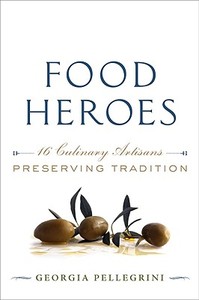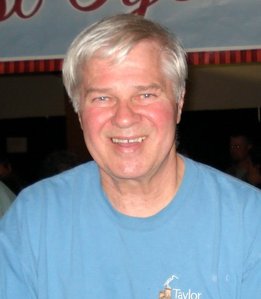Jon Rowley, as Cornichon readers know, is Seattle's seafood guru, the man who brought us Copper River salmon and Puget Sound oysters. He may not be a household name, but he's known to fishermen, farmers, chefs and food writers across the country. Without Rowley, a Reed College droupout who spent a decade fishing in Alaska, Seattle wouldn't know what a fresh oyster even tastes like.
So when Georgia Pellegrini first arrived in Seattle to interview Rowley for her book project about food artisans around the world, she'd already been seduced (figuratively); by a gift-box of Totten Inlet Virginicas that Rowley had sent her. At his home in Magnolia, he feeds her scrambled eggs with Swiss chard and a salad of purslane and heirloom tomatoes; at the Ballard farmers market, they buy the makings of ratatouille; at Fisherman's Terminal, Yukon King salmon. He teaches her about umami. "They were the best eating days of my life," she writes, "where I first encountered the beautiful taste."
There are 16 chapters about modern-day food heroes in Pellegrini's new book. The Seattle chapter centers on Rowley's ceaseless quest for beautiful tastes; it takes on added layers of complexity with the smells (and sounds) of Kate McDermott's pies. In a post on Cornichon a couple of years ago, I called them "Local Treasures." Saveur had just named Jon to its list of "Top 100" (tastes, taste-makers), and--separately, on its own merits--printed a picture of Kate's blackberry pie on the cover. The story of Jon and Kate's courtship (he brings her flowers: ten thousand compsting roses) is poignant, since they have since separated. (She teaches pie-making classes and writes a blog for bakers, theartofthepie.)
In addition to Rowley, Pellegrini's book profiles a potato-breeder in Sligo, Ireland, an olive farmer in Provence, a butter maker in England, a beekeeper in Norway, all lovingly showcased in glowing, late-afternoon light. Heroes from rural Kentucky, coastal California.and remote corners of Tennessee and Colorado make appearances as well. Pellegrini is a bit of a media hound, a former chef who now has a hot blog and a TV show in the works. (And ill-served by lazy copy-editing. Les Baux is the village in Provence where the mineral bauxite was discovered; it's not Les Beaux.) For the moment, she travels the world meeting the artisans who have made a lifetime commitment to good food. Yes, they begin to blur together after a while, all these uncompromising individualists, so the profiles are best taken in small doses. The overall effect, however, is one of optimism, of hope for humankind and the planet we inhabit.
Then again, you don't have to travel the world to come up with culinary artisans. Braiden Rex-Johnson's Pacific Northwest Wining & Dining (John Wiley & Sons, 2007) profiled a lineup of wine makers and chefs as part of a cookbook. So did Kurt Beecher Dammeier in Pure Flavor (Clarkson Potter, 2007). You could probably burrow down into a city, or even a neighborhood (fractal-like), and find a dozen stubborn "originals" preserving their traditional foods and culture.
One necessary word of clarification. Rowley was the first winner of Seattle Weekly's annual Pellegini award, which honors the memory of Angelo Pellegrini (1904-1991), a professor of English literature at the University of Washington and passionate writer about food. Author Georgia Pellegrini is no relation, but for those who remember Angelo, you know he'd not only love this book, he'd be in it..
Georgia Pellegrini reads from Food Heroes at 7 PM at Elliott Bay Books, 1521 10th Avenue, Seattle.
Food Heroes: 16 Culinary Artisans Preserving Tradition (Stewart Tabori & Chang, 240 pages, $24.95)


Leave a comment